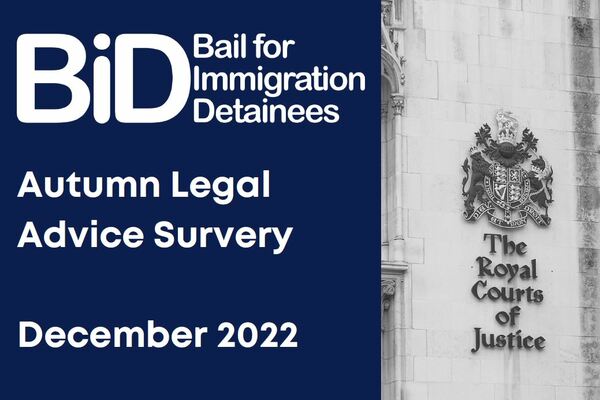New research published today based on the testimony of 42 individuals held in detention centres in the UK gives rise to serious concerns about the quality of legal advice available.
This is the first legal advice survey in Immigration Removal Centres that BID has carried out since the onset of the Covid-19 pandemic.
Just 43% of people have legal representation in their immigration case. This is the same figure as for May 2013, and across 19 Legal Advice Surveys the figure has never been lower. It is also significantly lower than in previous years – in 2019 the figures were at 64% (Spring) and 59% (Autumn). This marks an alarming trend, particularly against the background of the Nationality and Borders Act 2022 which criminalises and punishes people subject to immigration control, removes basic rights, and introduces procedural hurdles that make it more difficult to challenge Home Office decisions. The figure is unacceptably low – everybody in detention should have the right to a legal representative.
Immigration advice for people in detention has never recovered from the deep cuts to immigration legal aid in 2013. In BID’s last legal advice survey before the Legal Aid cuts came into force, 79% of respondents had legal representation, but since then there has only been one BID legal advice survey where the number of people with a legal representative was above 60%.
Out of 24 people who had previously been in prison, only 2 people received legal advice from an immigration solicitor while held there. These findings are consistent with the results of our recent prison legal advice survey which found that people detained in prisons under immigration powers face immense and sometimes insurmountable barriers to accessing legal advice.
- 15 people told us that they were not aware of how to access free legal advice in the removal centre.
- Not a single person had been told about the Exceptional Case Funding scheme (for accessing legal aid in cases that are out of scope)
- 4 people have had to find a new solicitor as a result of being moved from one detention centre to another.
People who used the internet to research their case said that websites had been blocked, including websites that would potentially have been helpful in preparing their immigration case. Social media continues to be banned across the immigration detention estate, an unnecessarily restrictive step which is inconsistent with the fact that immigration detention is administrative rather than punitive.
Out of 23 people who did not have a lawyer, 6 said that money was a contributing factor, 3 people said that they were not provided with enough information or did not know how to get one, and 5 people indicated that they had tried to find a lawyer but had been unable to find anybody, or had previously spoken with solicitors but this had not led to their case being taken on.
Of those with a lawyer, 7 people said that their lawyer had not applied for bail for them.
We recommend an end to immigration detention altogether. In the interim period, the government should take a number of steps to improve access to justice including:
- Automatic provision of legal advice at the point of detention
- Ensuring there is access to immigration advice for people in prison, and an end to the use of prisons to hold people post-sentence under immigration powers
- Reverse the 2013 legal aid cuts
- Reforms to improve the quality of advice delivered under the DDA scheme.









